Search
Showing 10 of 1954 results for NARSC 2016 conference registration fees student pre advance late July 2016
-
Advice for international education staff navigating counselling for their students
Due to issues that have been raised with ENZ, we thought it would be a good idea to clarify that any student who needs support should reach out to the services available. INZ advises that accessing counselling is unlikely to be an immigration issue.
The past year of the pandemic has put a huge amount of stress and strain onto everyone, including international students.
It is more important than ever that international students access support services such as counselling if they need to.
Immigration New Zealand (INZ) supports ENZ in this important message – students should seek out counselling when they need it.
When applying for a new visa, students do have to declare details of ongoing healthcare they require – including what the treatment is, what it is for, the degree of treatment and how their condition is being managed.
A student does not need to declare that they have had counselling as part of their visa application unless they have significant mental health issues that require hospital care.
“In recent weeks, we’ve heard from members of the sector that some international students are shying away from seeking support because they’re afraid it’ll affect their current or future visas,” ENZ Director – Student Experience & Global Citizens, Sahinde Pala, said.
“The past 12 months has been an incredibly challenging period for everyone. Students out there feeling stressed or missing their loved ones at home should know that they are not alone.”
-
Reconnecting New Zealanders to the world
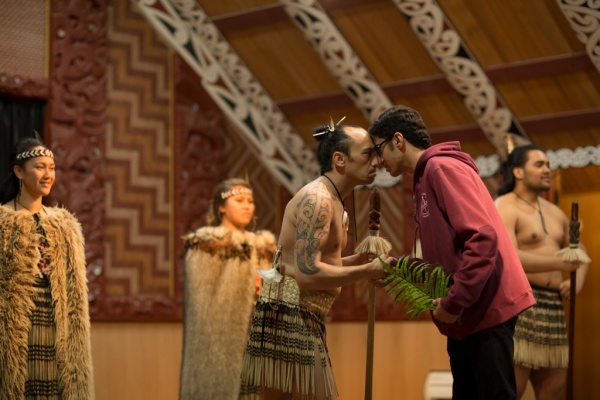
Where does international education fit in?
Prime Minister Jacinda Ardern has announced a plan to reconnect New Zealanders to the world in 2022.
This framework is based on being able to maintain the elimination strategy, alongside a high coverage of vaccination, strong confidence in our system and a phased approach to opening the border.
Read the Prime Minister’s announcement in full | Reconnecting New Zealand to the world on Unite Against COVID-19 site
The key points of this plan are:
- To continue to speed up New Zealand’s vaccination rollout, and move to six weeks between doses so that more New Zealanders have immunity sooner.
- Phased approach to reopening border in the second half of 2021, and set up of new testing and vaccine checking systems at the border.
- Move to new, risk-based border settings that will establish low, medium and high-risk pathways into the country.
New Zealand’s ability to reconnect with the world depends on these factors being successful.
At this early stage, we can’t provide detail or any degree of certainty for students looking to apply for study in or book travel to New Zealand.
Many New Zealand institutions are now offering new ways to study. If you’re wondering which study option might be right for you, visit Study With New Zealand New Ways of Learning.
We suggest that agents, students and their families wait until policy announcements are made before booking any travel to study in New Zealand. We could expect to see more clarity on this later in the year.
FAQs
When will New Zealand open up to the world?
Work continues on developing the requirements for a phased approach to Reconnecting New Zealanders to the rest of the world in 2022. We could expect to see more clarity on this later in 2021.
Read more about the next steps to reconnecting New Zealanders to the world.
What do we know about timeframes for international students returning to New Zealand?
While we are pleased to note that a number of international students have been able to return to New Zealand under the current class exceptions, we aren’t able to provide exact timeframes for a large-scale return for international students and providers.
Managing our border doesn’t mean conditions will stay exactly as they are now, but it does mean that there are likely to be restrictions and requirements in place until at least December 2022.
Can students apply for semester 1 2022 study?
We would currently advise students not to plan for study in New Zealand for semester 1, 2022.
Please note offshore temporary visa application lodgements are currently suspended till February 2022 and this may be extended.
International student class exceptions are a key priority for the Government, but we can’t predict timing on when a further cohort might be announced, or what MIQ capacity may look like at the time.
Will the phased border approach outlined in the Reconnecting New Zealanders to the World announcements affect the temporary suspension of offshore visa application lodgements?
The Government continues work on developing the requirements for a phased approach to Reconnecting New Zealanders to the rest of the world in 2022. As such, no decisions have been made yet on how the border plan might affect offshore visa application lodgements.
What is the Government’s position generally regarding international education?
Despite the severity and complexity of the COVID-19 pandemic, and our ongoing commitment to its elimination strategy, the New Zealand Government remains committed to a thriving international education sector.
In a recent meeting with the international education sector, the Minister of Education highlighted the New Zealand Government’s support for the continued safe return of international students to New Zealand, when the time is right.
How does the border approach affect the students coming into New Zealand under the border exception classes?
It doesn’t. Existing processes for students to enter the country under existing border exception classes (the 250 PhD and postgraduate cohort and the 1000 bachelor's degree and above cohort) will remain in place.
How will New Zealand determine which countries are low, medium or high-risk?
The government is currently working through how it will determine this.
How will the phased border approach affect Managed Isolation and Quarantine (MIQ)?
Vaccinated travellers from low-risk countries will not be required to go through managed isolation facilities.
Vaccinated travellers from medium-risk countries will have modified isolation requirements, the details of which are still to be worked through.
Unvaccinated travellers and all travellers from high-risk countries will need to undergo 14 days in MIQ.
Read more on the next steps of reconnecting New Zealanders to the world
Would lockdowns in New Zealand affect the timing of the phased border approach?
The New Zealand Government is committed to the elimination strategy and the successful rollout of vaccines. New Zealand’s border approach depends on our ability to stamp out clusters of COVID-19 as they arise, so there is some possibility that further lockdowns may delay the border approach.
Will international students in New Zealand continue to receive free COVID-19 healthcare?
Yes. Vaccines are available to everyone in New Zealand (12 years and over) free of charge. This includes international students.
Read more about the COVID-19 vaccine rollout on the Ministry of Health website.
All publicly funded COVID-19 related care – including testing, treatment and vaccinations – is provided to anyone who needs it, free of charge.
-
Kia noho haumaru – stay safe
The uncertainties of COVID-19 continue to impact us all. With Auckland into its fifth week at Alert Level 4, and the rest of New Zealand operating under Delta 2, looking after our collective wellbeing is more important than ever.
We know that while many international students are doing well, others may be struggling with the demands of the pandemic both here in Aotearoa New Zealand and on their families and friends overseas. I’d like to acknowledge the continued hard work by staff members, student associations, homestay providers and others supporting international students over the past 20 months – thank you for your incredible manaakitanga.
If you work with and support international students, please find some resources below that might be useful to complement your mahi.
The NauMai NZ COVID-19 page (in English and simplified Chinese) is currently updated almost daily, providing trusted information for international students on alert level settings, vaccinations, health and wellbeing resources, support options and more. This information is also replicated on the NauMai NZ WeChat mini programme.
Other resources include:
New content continues to be added to NauMai NZ. We recently added a new video welcome to the homepage, and we encourage you to share with your networks to raise awareness of the platform.
Finally, I want to acknowledge that this week is Te Wiki o te Reo Māori, Māori Language Week. The 2021 theme is ‘Kia kaha te Reo Māori’ (let’s make the Māori language strong). You can find resources, videos and inspiration at https://www.reomaori.co.nz/.
On that note, I’d like to leave you with one of our favourite whakataukī (proverbs):
Ko te manu e kai ana te miro, nōna te ngahere. Engari, ko te manu e kai I te mātauranga, nōna te ao. The bird that consumes the miro berry, owns the forest. However, the bird that consumes learning, owns the world.
Ngā mihi,
Sahinde Pala
Education New Zealand Manapou ki te Ao Director Student Experience & Global Citizens
-
New student forum for NauMai NZ WeChat mini programme
Education New Zealand’s NauMai NZ platform is designed to inform, support and empower international students.
A WeChat mini programme – an app designed for the WeChat ecosystem popular with Chinese students – has extended NauMai NZ’s reach, attracting over 12,000 users in its first year.
The NauMai NZ WeChat mini programme helps students make the most of their New Zealand experience, with advice on everything from finding a part-time job and knowing their rental rights to looking after their wellbeing and understanding Kiwi English. There are also stories from students about their lives – for instance, people sharing ideas on what to do during their summer in New Zealand.
“We know that Chinese students prefer to connect with each other in their language, on the WeChat channel they trust,” says Faymie Li, Senior Advisor for Student Experience at ENZ.
“We’re delighted to see how much they enjoy this digital platform and how quickly it’s growing. It’s great to be able to connect Chinese students to each other and to people who’re willing to help them out.”
The WeChat mini programme has now run six livestreams hosted by experts, alumni and current international students on topics including employability, how to grow your network, and mental health and wellbeing. Students tuning in to watch can use the chat feature to ask questions.
The livestreams have attracted a total of nearly 3,000 live views with over 18,000 engagements during the live events and, so far, more than 1,000 views afterwards.
The WeChat mini programme has now added a new forum so that Chinese students and alumni can better share their life and study experiences and support one another. The text-based, moderated forum allows students to have their questions answered by their peers.
A group of international students have signed on as ambassadors for the WeChat forum, including alumni from the Prime Minister’s Scholarship for Asia programme. One of the forum ambassadors, Mengdi Zhang, says she’s looking forward to connecting with newer students.
“I am excited to be a student ambassador so that any students with unresolved questions can reach out. I can see my own past in the students’ questions, and I hope to help them through to a better experience in New Zealand,” she said.
If you would like to know more about the NauMai NZ WeChat mini programme, contact faymie.li@enz.govt.nz. You can share it with others using the WeChat QR code.
-
Around the world in five: March 2022
International
Opinion... from the News Editor, 17.03.22
India joins hands with Australian government to establish taskforce on qualifications recognition
New Zealand
New Zealand confirms details of 5,000 international student cohort
Call to end cap on number of international students allowed in NZ
Australia
Once again, international student ‘exports’ are wildly exaggerated
Australia's one-off opportunity to change its approach to international students
Only Half of International Students May Return to Australia This Year
Aus: $10m innovation fund revealed
India
Auckland University Offers 10 Virtual Internships for Indian Women Students
Everest Twins and Miss Malini share their stories at International Women’s Summit
Edtech a big draw among teachers despite covid ease
United Kingdom
Record UK University Applications from UAE
United States
Biden immigration rule will harm American college graduates, expert warns
US: international students say experience doesn’t justify cost
Vietnam
Bravery of international students after Covid-19
New Zealand offers digital technology training scholarships to teachers
-
Strong start for Cohort 4 international students
Already more than 3,500 international students have been nominated by their education providers and confirmed by education agencies. More than 1,900 of these students have had their Request for Travel approved and have been invited by Immigration New Zealand to apply for their student visas, since the process opened on 13 April 2022.
Places remain available for students with a number of ELS and PTE providers. Only education providers can nominate students for this cohort. Interested international students or their agents should contact ELS or PTEs as soon as possible. Of the 5,000 places in this cohort, 1,000 were allocated to ELS and 850 to PTEs, with the remainder going to universities, Te Pūkenga, and secondary schools.
Once they have been nominated by an education provider and confirmed by education agencies, students have two weeks to make their Request for Travel through the Immigration New Zealand website. Following approval of the Request for Travel, students then have one month to complete and submit a student visa application to Immigration New Zealand, in time for a mid-year start for their studies.
Education providers are due to complete their nominations by 6 May 2022. Any unused places will be transferred to other providers, which means that some providers may get additional places as part of the reallocation process.
This is the fourth cohort of international students to be granted a border exception to enter New Zealand and is part of the progressive reopening of our borders. All visa categories are due to reopen from October 2022 onwards, including visitor and student visas.
For more information on this cohort of international students, see Cohort 4 » Education NZ (enz.govt.nz)
-
New advisory board to support our North American strategy
Established by Education New Zealand Manapou ki te Ao in 2021, this voluntary advisory board includes former Study Abroad scholarship winners to New Zealand, independent education counsellors, and senior leaders in international education in the United States. Members have a shared interest in developing educational ties between the US and NZ and are supporting ENZ’s North America team to implement our strategy for this market.
The 10-member board has established three sub-committees that will develop signature projects to raise awareness of New Zealand’s education brand and promote student flow between the two countries. The sub-committees cover:
- Alumni engagement and student experience: Three board members were former students in New Zealand and discussed ways in which ENZ and institutions could better support international students before, during, and after their study experience in New Zealand.
- State consortia engagement: The United States is vast and decentralised. This sub-committee is advising and assisting with partnership development around State-run education consortia that, in some States, oversee international education initiatives from Kindergarten through PhD-level Colleges and Universities.
- Foundation engagement: In the US, grants, research and special projects are largely funded by foundations set up by companies and individuals. Sub-committee members will use their expertise and networks to help identify foundations whose interests align with ENZ’s and New Zealand’s education and economic goals to set up funded partnerships between the two countries.
The overall aim of this work is to:
- position New Zealand as a destination of choice for students from diverse backgrounds by promoting and changing the understood narrative of New Zealand
- identify and develop strategic, reciprocal partnerships that align with our goals
- evaluate aspects of our programming and outreach related to:
- diversity, equity, and inclusion (DEI)
- student care
- help the ENZ North America team determine how we translate and explain Māori values to North American audiences, how they relate to our work, and how they can contribute to the field of international education
- provide a North American context to international education including but not limited to study abroad, full degree, exchange, and hybrid learning.
DEI is a core part of ENZ’s North American strategy for international education. We hope to move beyond perceptions of New Zealand as a country suitable for adventure seekers, to position New Zealand as a diverse country with a strong bicultural heritage, rich ideals of social justice, and an ideal education destination for students from marginalised backgrounds.
-
Inviting feedback on the Capability Toolkit project
More than 36 pages of tips, guidelines, tools, case studies and scenarios have been developed for the online resource, and ISANA NZ is seeking your feedback.
Material is grouped around key themes that include wraparound tailored support, intercultural competence in education contexts, and student experience information for agents and offshore partners. The toolkit will be published early in 2023.
“This is all about delivering an excellent student experience,” says Chris Beard, ISANA’s Executive Director.
“The toolkit will promote evidence-based practice that supports innovation, nimbleness and risk mitigation, and aligns with the Education (Pastoral Care of Tertiary and International Learners) Code of Practice 2021, which came into effect this year.”
To browse selected draft pages and provide feedback, go to the ISANA NZ website, and select ‘Toolkit’. To share your reflections, ideas and suggestions, please email content@isana.nz with the header 'Capability Toolkit feedback'.
You may also be interested in the following video presentation about the new toolkit, which was delivered for NZIEC KI TUA 2022: KT004 Student Experience Chris Beard Friederike Tegge - YouTube.
The next in-person presentation about the toolkit will be held at Victoria University of Wellington-Te Herenga Waka on 2 December, 10.30 – 12pm, AM106 (Alan MacDiarmid). Please contact chris.beard@isana.nz to register your interest.
-
International students welcomed across New Zealand
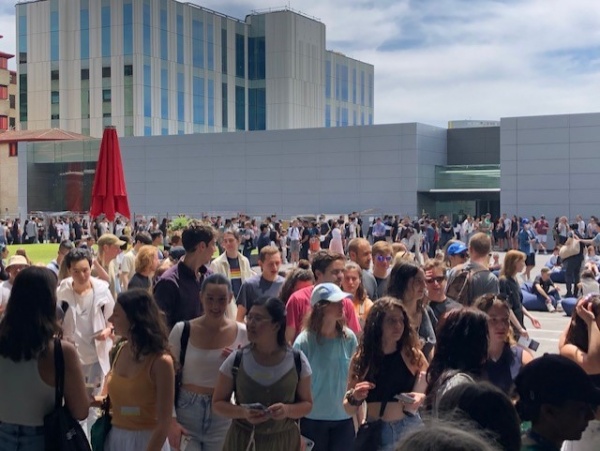
In February, hundreds of international students gathered at a University of Auckland orientation event. ENZ’s Student Experience Manager, Ross Crosson, says, “The wait, for many, has been long but there was a very positive vibe in the air.”
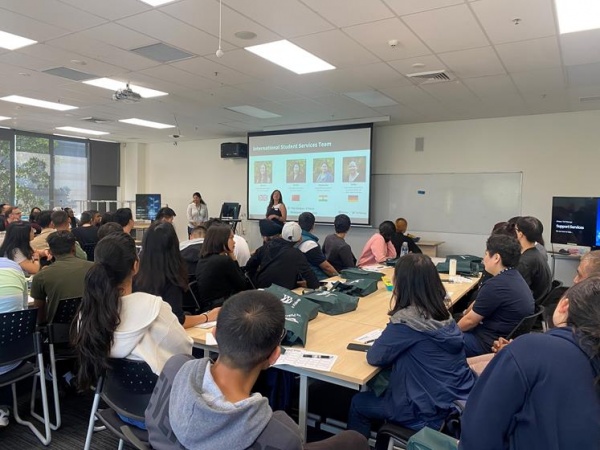
In Hamilton, the Wintec | Te Pūkenga International student services team held an interactive event to welcome students on campus. They used a range of activities to create connections amongst the students and to familiarise them with student support services available.
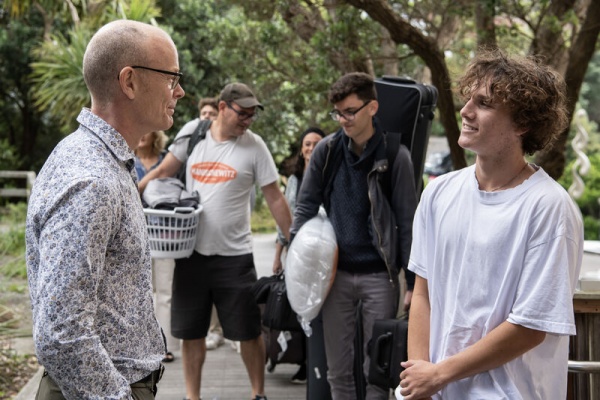
Over in Wellington, Victoria University of Wellington Vice Chancellor Nic Smith took the opportunity to connect with students face-to-face as they were settling into halls of residence.
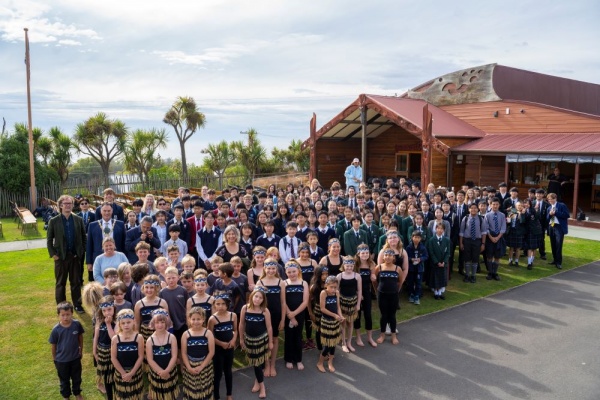
More than 150 international students from 11 local secondary schools were welcomed into Dunedin at Puketeraki Marae on 8 March. In the event organised by Enterprise Dunedin and Kāti Huirapa Rūnaka ki Puketeraki, the guests spent the morning at the pōwhiri, which was accompanied by pupils from Waitati School kapa haka group, and then enjoyed a kōrero and some kai.
-
NauMai NZ and the NauMai NZ WeChat mini programme
‘Nau mai’ is a te reo Māori phrase of invitation and welcome and NauMai NZ is the NZ government's official student experience platform, designed to support international students living and studying in Aotearoa New Zealand
NauMai NZ is written in plain English and provides practical, trusted, peer-reviewed content, designed to support and improve students’ living and study experiences. This includes information and resources to support students before arriving in Aotearoa (including useful tips on moving to New Zealand and what they need to bring), though to information to help them navigate daily life once here, including on:
- Making friends and building social connections
- Exploring and experiencing Aotearoa – the culture and the country
- Getting advice to improve wellbeing, study and living experiences
- Managing money, finding accommodation, and understanding healthcare in New Zealand
- Balancing work and study and understanding workplace culture, and much more.
You can explore more via this link.
ENZ has also developed the NauMai NZ WeChat Mini Programme. This is a companion platform to the English platform, to better support Chinese students who prefer the WeChat ecosystem. Information from the English platform is available in Chinese on the mini programme, as well as specific features that provide peer-to-peer support, such as video sharing, livestreams, forum functionality and student stories.
The following QR codes can be shared with your international students. Printed flyers are also available and so if you would like these sent to you, or have any questions for our Student Experience team, please do not hesitate to contact Faymie Li, faymie.li@enz.govt.nz, and Ross Crosson, ross.crosson@enz.govt.nz.
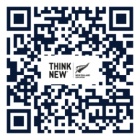

Manaakitanga is at the heart of what we all do, and ENZ aims to support you and your mahi. He waka eke noa. We are all in this together.

